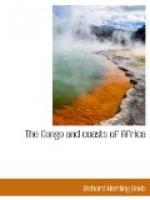His expression, and he had a perfectly human expression, was one of extreme annoyance and of some slight alarm, as though he were muttering: “This is no place for me,” and, without more ado, he began to roll toward the river. Without killing some one, I could not again use the rifle. The boys were close upon him, prying him back with the gangplank, beating him with sticks of firewood, trying to rope him with the steel hawser. On the bridge Captain Jensen and Anfossi were giving orders in Danish and Italian, and on the bank I swore in American. Everybody shoved and pushed and beat at the great bulk, and the great bulk rolled steadily on. We might as well have tried to budge the Fifth Avenue Hotel. He reached the bank, he crushed it beneath him, and, like a suspension bridge, splashed into the water. Even then, we who watched him thought he would stick fast between the boat and the bank, that the hawser would hold him. But he sank like a submarine, and we stood gaping at the muddy water and saw him no more. When I recovered from my first rage I was glad he was still alive to float in the sun and puff and blow and open his great jaws in a luxurious yawn. I could imagine his joining his friends after his meeting with us, and remarking in reference to our bullets: “I find the mosquitoes are quite bad this morning.”
With this chapter is published the photograph Anfossi took, from the deck of the steamer, of our hippo—the hippo that was too stupid to know when he was dead. It is not a good photograph, but of our hippo it is all we have to show. I am still undecided whether to hang it in the hall or the dining-room.
[Illustration: The Hippopotamus that Did Not Know He Was Dead.]
The days I spent on my trip up the river were of delightful sameness, sunshine by day, with the great panorama drifting past, and quiet nights of moonlight. For diversion, there were many hippos, crocodiles, and monkeys, and, though we saw only their tracks and heard them only in the jungle, great elephants. And innumerable strange birds—egrets, eagles, gray parrots, crimson cranes, and giant flamingoes—as tall as a man and from tip to tip measuring eight feet.
Each day the programme was the same. The arrival at the wood post, where we were given only excuses and no wood, and where once or twice we unloaded blue cloth and bags of salt, which is the currency of the Upper Congo, and the halt for hours to cut wood in the forest.
Once we stopped at a mission and noted the contrast it made with the bare, unkempt posts of the State. It was the Catholic mission at Wombali, and it was a beauty spot of flowers, thatched houses, grass, and vegetables. There was a brickyard, and schools, and sewing-machines, and the blacks, instead of scowling at us, nodded and smiled and looked happy and contented. The Father was a great red-bearded giant, who seemed to have still stored up in him all the energy of the North. While the steamer was unloaded he raced me over the vegetable garden and showed me his farm. I had seen other of the Catholic Missions, and I spoke of how well they looked, of the signs they gave of hard work, and of consideration for the blacks.




